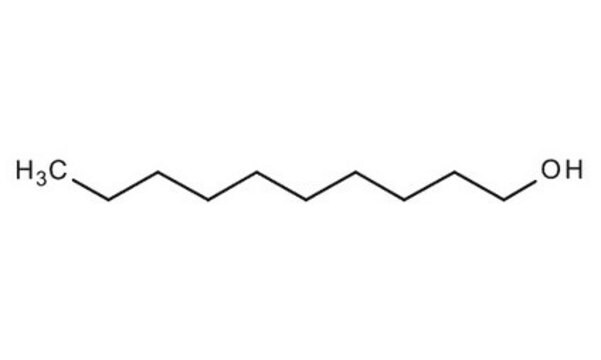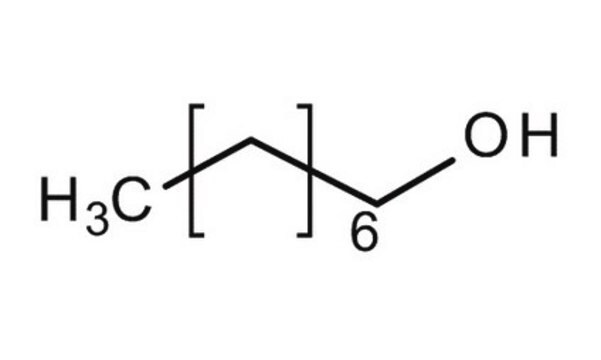150584
1-Decanol
98%
Synonym(s):
n-Decyl alcohol, Alcohol C10
About This Item
Recommended Products
vapor density
4.5 (vs air)
Quality Level
vapor pressure
1 mmHg ( 70 °C)
8.25 mmHg ( 100 °C)
Assay
98%
form
liquid
autoignition temp.
550 °F
refractive index
n20/D 1.437 (lit.)
bp
231 °C (lit.)
mp
5-7 °C (lit.)
solubility
H2O: slightly soluble 0.0211 g/L at 20 °C
density
0.829 g/mL at 25 °C (lit.)
SMILES string
CCCCCCCCCCO
InChI
1S/C10H22O/c1-2-3-4-5-6-7-8-9-10-11/h11H,2-10H2,1H3
InChI key
MWKFXSUHUHTGQN-UHFFFAOYSA-N
Looking for similar products? Visit Product Comparison Guide
Related Categories
Application
Signal Word
Warning
Hazard Statements
Precautionary Statements
Hazard Classifications
Aquatic Chronic 3 - Eye Irrit. 2
Storage Class Code
10 - Combustible liquids
WGK
WGK 1
Flash Point(F)
203.0 °F - Pensky-Martens closed cup
Flash Point(C)
95 °C - Pensky-Martens closed cup
Personal Protective Equipment
Certificates of Analysis (COA)
Search for Certificates of Analysis (COA) by entering the products Lot/Batch Number. Lot and Batch Numbers can be found on a product’s label following the words ‘Lot’ or ‘Batch’.
Already Own This Product?
Find documentation for the products that you have recently purchased in the Document Library.
Customers Also Viewed
Our team of scientists has experience in all areas of research including Life Science, Material Science, Chemical Synthesis, Chromatography, Analytical and many others.
Contact Technical Service













